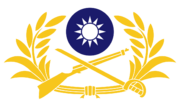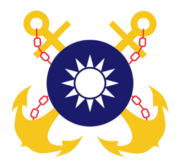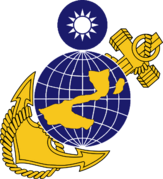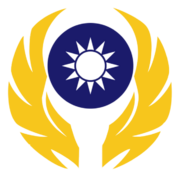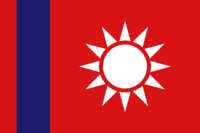Monsilvan Armed Forces
| Monsilvan Armed Forces | |
|---|---|
| 山国国军 (Monsilvan) Shānguó Guójūn (Pinyin) | |
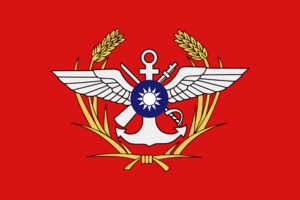 Flag of the Monsilvan Armed Forces and the Department of Defense | |
| Founded | 30 August 1830 (as the Monsilvan Royal Armed Forces) |
| Current form | 25 December 1978 (as current service) |
| Service branches | |
| Headquarters | Department of Defense, Amking, Monsilva |
| Leadership | |
| Commander-in-Chief | |
| Secretary of State for Defense | |
| Chief of Defense | |
| Manpower | |
| Military age | 18 |
| Conscription | None[1] |
| Active personnel | 310,000 |
| Reserve personnel | 420,000[2] |
| Expenditures | |
| Budget | ¥321 billion (₵53.3 billion) (2024) |
| Percent of GDP | 2.2% |
| Industry | |
| Domestic suppliers | |
| Foreign suppliers | |
| Related articles | |
| Ranks | Military ranks |
The Monsilvan Armed Forces (Monsilvan: 山国国军; pinyin: Shānguó Guójūn) are the armed forces responsible for the defense of the Monsilvan Republic. They consist of the Army, Navy, Marine Corps and the Air Force.
Originally established as the Royal Armed Forces in 1830, as a successor to the armed personnel that formed the Liberate Monsilva Movement which overthrew the Kingdom of Great Shan at the end of the Monsilvan Civil War. It served as the armed forces of the Kingdom of Monsilva from its establishment until the Monsilvan Republic was formed in 1978. Until 1963, the armed forces served as responsible forces for the defense of the country as well as assisting in international and domestic humanitarian crises or disaster relief. However with the establishment of martial law in Monsilva in 1963, the military gained a new purpose as the principal force for policing the citizens of Monsilva.
During the martial law period from 1963 to 1978, many military personnel abandoned the armed forces out of protest against their position as a police force. This was possible with minimal punishment until 1967, when abandoning the armed forces became an act of treason, which was punishable by death. Many members of the forces during this period abused their position of power which resulted in thousands of unnecessary arrests and hundreds of unnecessary executions during the martial law period. In 1975, with the clear development of a resisting force against the military lead government, many armed forces personnel defected to help form the Monsilvan Revolutionary Army which would eventually fight against the armed forces during the Monsilvan Revolution and in 1978 during the mass protests.
Since 1978, the armed forces have returned to their role as defense forces and as promoters of Monsilva's interests in humanitarian aid and disaster relief across Monsilva and Terraconserva.
Contents
Branches
Army
The Monsilvan Army (Monsilvan: 山国陆军; pinyin: Shānguó Lùjūn) is the principal land warfare service of Monsilva and a branch of the Monsilvan Armed Forces. The Army has around 172,600 currently active personnel and is lead by the Commander of the Army.
The Monsilvan Navy (Monsilvan: 山国海军; pinyin: Shānguó Hǎijūn) is the naval warfare force of Monsilva and a branch of the Monsilvan Armed Forces. The Navy has around 55,700 currently active personnel and is lead by the Commander of the Navy.
Marine Corps
The Monsilvan Marine Corps (Monsilvan: 山国海军陆战队; pinyin: Shānguó Hǎijūnlùzhànduì) is Monsilva's special operations capable commando force and amphibious light infantry. It is also a branch of the Monsilvan Armed Forces. The Marine Corps has around 13,600 currently active personnel and is lead by the Commander of the Marines.
Air Force
The Monsilvan Air Force (Monsilvan: 山国空军; pinyin: Shānguó Kōngjūn) is the military aviation branch of the Monsilvan Armed Forces. The Air Force has around 68,000 currently active personnel and is lead by the Commander of the Air Force.
Emblems
Equipment
- Equipment of the Monsilvan Army
- Equipment of the Monsilvan Navy
- Equipment of the Monsilvan Air Force
Ranks
See also
- Monsilvan Army
- Monsilvan Navy
- Monsilvan Marine Corps
- Monsilvan Air Force
- Monsilvan Armed Forces Reserve
Notes
- ↑ De jure the government has the ability to introduce compulsory military service at any time independent of whether Monsilva is at peace or not. However when conscription ended in Monsilva in 2008, the government said that Monsilva would never re-implement it for as long as the country was at peace.
- ↑ From 1978 until 2008, 6 month compulsory military service was still in place which resulted in many people being placed in the reserve forces after their service. Although in 2008 the people who had entered the reserves through this system were given permission to leave, many did not which has lead to a large number of reserve forces remaining today.
